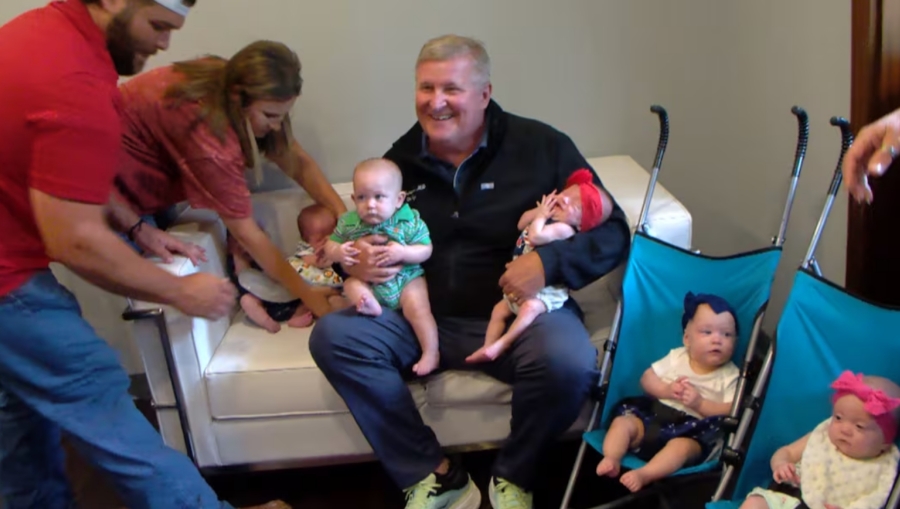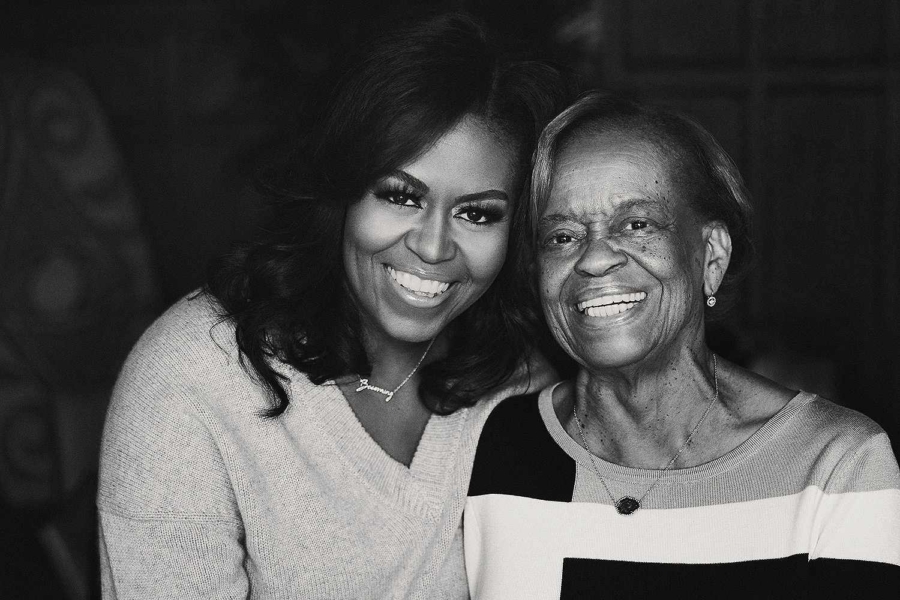:max_bytes(150000):strip_icc():focal(762x188:764x190):format(webp)/goff-triplets-lelan-bennett-william-goff-060225-2264668a6ee5446595ed5f4dcd6e59e1.jpg?w=1200&resize=1200,0&ssl=1)
Amber Goff’s three identical boys were “tiny” when they were born and stayed in the NICU for more than 100 days
NEED TO KNOW
- Amber and Cameron Goff were surprised to learn they were pregnant with identical triplet boys
- The boys shared a placenta and were in two amniotic sacs and would needed to undergo a complex procedure to save their lives
- At 27 weeks, they were born 1 -2 lbs. each but are now happy and thriving 1-year-olds
Amber and Cameron Goff received the surprise of their lives on March 5, 2024, when they visited Amber’s doctor for her 9-week ultrasound: She was pregnant with triplets.
The Houston couple hadn’t done any IVF or fertility treatments and says there are no twins or triplets on either side of their families. “Everyone always asks that,” says Cameron Goff, a 28-year-old internal medicine resident.
:max_bytes(150000):strip_icc():focal(739x428:741x430):format(webp)/cameron-amber-goff-maternity-photo-shoot-060225-1df4e59be4ac4d76943b89f8c4e60a5b.jpg)
Then, at their 14-week ultrasound, the first-time parents learned that their babies were boys and that the triplets were identical.
Two weeks later, at a 16-week appointment, they got a scarier update: The boys had a rare type of Twin-Twin Transfusion Syndrome, a condition where all three shared one placenta. In addition, they were in two amniotic sacs. (Normally, the babies would all be in one amniotic sac or all three would be in separate sacs, Cameron explains.)
“The doctor said, ‘We’ve never seen this kind of triplet,'” remembers Amber, a 26-year-old accountant. “That was crazy.”
Blood vessel connections in the placenta allowed the brothers to share a blood supply, but it wasn’t being shared equally. “Baby C” was giving a large amount of blood to his brothers, “Baby A” and “Baby B.” The extra blood volume could overload Babies A and B and strain their hearts. Plus, it left Baby C without enough blood and amniotic fluid; he was much smaller than his brothers.
“This is a very serious situation,” says Dr. Ahmed Nassr, fetal surgeon at Texas Children’s Pavilion for Women. “This is a big problem.”
Without treatment, Nassr says, there was a less than 10% chance all three babies would survive.
:max_bytes(150000):strip_icc():focal(616x417:618x419):format(webp)/cameron-amber-goff-triplets-sonogram-060225-4833d0ad56a5406d824da8bc2afc4abd.jpg)
“It was scary,” Amber Goff, says. “Doctors were like, ‘You’re just going to have to take it day by day.’ And I’m like, “When can I stop taking it day by day?” And they’re like, ‘I don’t know.’ So that’s obviously very hard to hear.”
Doctors said they had to perform a complicated surgery while the babies were in utero. But even if the procedure successfully separated the babies’ blood vessel connections, doctors didn’t know if “Baby C,” the smallest baby who was giving away his blood, would survive. But without the surgery, the other two would likely experience heart failure.
“I remember thinking, ‘This is the only option, so we’re doing it,’ says Cameron. “They’re telling us we need this, let’s do it.”
Amber had ultrasounds every day, and doctors were hoping to wait until 18 weeks, mid-May, to do the procedure.
“We watched the pregnancy very closely,” Nassr says. “We tried to give her some time.”
But at 17 weeks and two days, Nassr says there was early evidence that the babies’ hearts were starting to fail.
On May 9, Nassr separated the babies’ connections in what he describes as a “very complex surgery.”
Amber says she’s grateful the doctors seemed calm and didn’t mention worst-case scenarios until after the procedure was successful. “They were worried — but they didn’t make us feel worried at all,” Amber says.
“I felt a lot of peace throughout the entire process, which sounds so weird,” Amber says. “Everyone’s like, ‘Are you scared?’ And I felt very peaceful. Maybe it was a delusion. Who knows? I just really felt this deep sense that everything was going to be fine,” she says.
:max_bytes(150000):strip_icc():focal(756x447:758x449):format(webp)/amber-cameron-goff-triplets-hospital-060225-dddc71f6a5354b2a9efea427ca10d51b.jpg)
Although the babies’ official due date was in October, triplets usually are born after 32-35 weeks, according to the Cleveland Clinic. Amber Goff hoped to deliver the babies in August, near her own birthday. But she went into labor a month before that, and the babies were born on July 16 via C-section at Texas Children’s Pavilion for Women.
Lelan Corder Goff weighed 1 lb., 15 oz.; Bennett Corder Goff was 2 lbs., 3 oz.; and William Corder Goff was born weighing 1 lb., 12 oz.
“I was really nervous. I was like, “The babies are too small,” Amber Goff says. She holds up her cell phone, and says they were “maybe a little longer.”
“They were tiny,” Cameron says, just a little bigger than their parents’ hands.
The brothers stayed in the NICU for more than 100 days. They were in the same corner room, and each baby had a dedicated nurse.
And having 1-2 lb. babies in the NICU was terrifying, Amber says.
:max_bytes(150000):strip_icc():focal(691x458:693x460):format(webp)/goff-triplet-hospital-060225-c835f7d5b5db4adaa630c7eb50018da4.jpg)
“When they were in the NICU, it’s really scary. But you don’t really have a choice. You have to show up. And you can’t be a hot mess every single second of the day because you’re dealing with doctors and sitting bedside,” she says. “You can be totally freaking out inside but you have to get up and do it and be the parent. I was learning how to be a parent, too, at the same time. It’s not about me anymore. Today it’s about his oxygen saturation.”
The couple lives 10 minutes from the hospital, so they would come home to sleep and then rush back to the NICU.
“It was a lot of brave face,” Amber Goff says. “I find myself more emotional now because it was pure survival mode. I was hyper focused on all the data constantly pouring through my phone and everybody messaging me all the time…it almost feels more raw now, because I’m in a safe space to feel all the anxiety and all the panic.”
She was especially worried about Lelan, who had bowel surgery. “At one point, they told me that, based on his surgery, his survival rate was like 50 percent. It’s honestly a coin flip,” she says. “He almost died several times. It was a nightmare.”
On September 27, Lelan had surgery to remove the damaged portion of his intestine, and he had to move to a higher-level NICU than his brothers.
Bennett and William had a relatively uneventful NICU stay. They learned how to bottle feed, and they were able to go home when they were 44 weeks old. They came home from the hospital in early November.
About two weeks later, on Thanksgiving, Lelan came home.
And just like that, Amber and Cameron were round-the-clock parents of three tiny humans. “It’s really made us work as a team even more and communicate,” says Cameron. “Someone always needs attention, or someone’s crying. They say, ‘Sleep when the baby sleeps.’ But it’s hard to get all three of them to sleep at the same time. By the time we get the third one down, the next is waking up in 20 minutes.”
:max_bytes(150000):strip_icc():focal(762x188:764x190):format(webp)/goff-triplets-lelan-bennett-william-goff-060225-2264668a6ee5446595ed5f4dcd6e59e1.jpg)
In May, the boys weighed around 15 lbs. They each drink eight bottles a day (and their mother has been pumping breast milk, so she says they wash around 50 bottles a day because of the stored milk). .
“They’re so different,” Amber says. “Bennett is a hyper muscle man. He is just so active. You pick him up, and he’s just like this little ball of energy. William, we say he’s the brains of the operation. He wants to manipulate things. He’s a genius. And then Lelan is just the biggest softest little cuddle bug. He just melts onto you — whereas Bennett tries to springboard off of you somewhere. And William tries to pull my earrings out.”
Now, the triplets are a year old. They celebrated their first birthday with a giant party with a ONE Silly Goose theme. Amber Goff made birthday crowns and embroidered them. They invited everyone who supported them throughout their pregnancy and NICU stay — including two NICU nurses.
“In the NICU, the nurses were just so sweet,” Amber says. When she takes the babies to the hospital for physical therapy, if the nurses are working, they come and visit the boys. “We formed really great relationships,” she says. “The nurses in the NICU and the doctors were just wonderful.”
:max_bytes(150000):strip_icc():focal(749x0:751x2):format(webp)/lelan-bennett-william-goff-081425-3-1610accd8992433ea3fb48a6b6d979c7.jpg)
The triplets are thriving. Lelan now weighs 16 lbs., William is 18 lbs. and Bennett is 19 lbs.
“They’re doing really well,” Amber says. “They’re eating. They just started clapping at each other. William is so close to crawling. And all Lelan wants to do is eat Ritz crackers and watch golf.”
Despite the chaos of raising triplets, the couple is incredibly grateful their children are home and healthy.
“When they’re screaming because they’re hungry or crying and pee all over the couch because it took too long to put their diaper on, you just have a lot more perspective, says Amber. “It makes it easier because you’re not upset that they’re screaming. You’re just happy that they’re here, which sounds like cheesy and dumb. But you’re just so grateful that everybody came home completely healthy.”
“At the end of the day, they all came home. They’re perfectly normal, healthy babies. And that in itself is such a miracle.”
:max_bytes(150000):strip_icc():focal(749x0:751x2):format(webp)/lelan-bennett-william-goff-081425-2-7df2febdb1fc49d6a1259f32fb40354e.jpg)

:max_bytes(150000):strip_icc():focal(749x0:751x2):format(webp)/Vencent-Hickerson-111925-6-f70136ab95854fed905274e761d98e0f.jpg?w=1200&resize=1200,0&ssl=1)


:max_bytes(150000):strip_icc():focal(999x0:1001x2):format(webp)/bella-brave-tiktok-transplant-081023-tout-e2fc0d921f1848f497811d97fc002ed2.jpg?w=1200&resize=1200,0&ssl=1)
















:max_bytes(150000):strip_icc():focal(749x0:751x2):format(webp)/Christianna-Apps-5-121825-ae06cb988405460987109364d7c522c3.jpg?w=1200&resize=1200,0&ssl=1)

:max_bytes(150000):strip_icc():focal(999x0:1001x2)/Zach-Roloff-Post-Brain-Surgery-20230209_40-2000-0a38151705d74b75aabee6a08b7add33.jpg?w=1200&resize=1200,0&ssl=1)
















:max_bytes(150000):strip_icc():focal(750x347:752x349)/Nikki-Bahan-family-020326-4-edc823666828480cb5eb6b593cdc677a.jpg?w=1200&resize=1200,0&ssl=1)